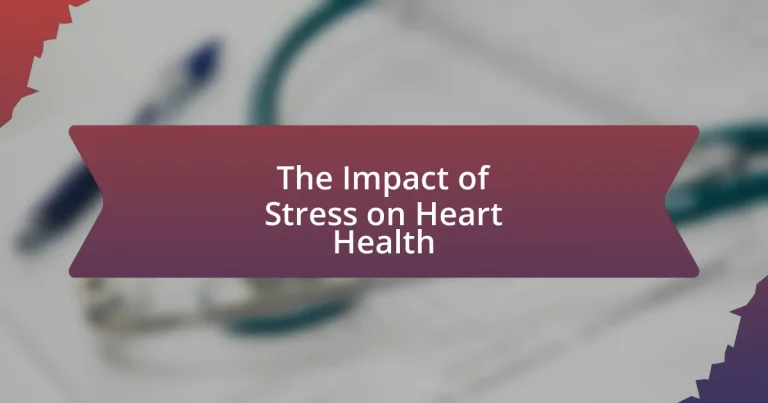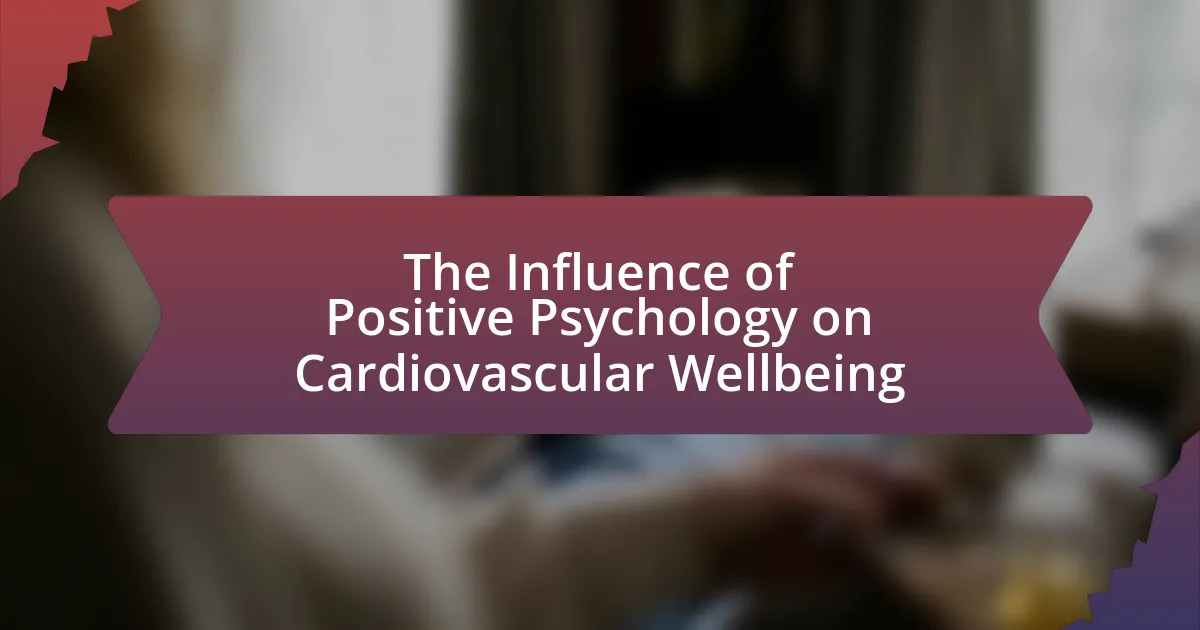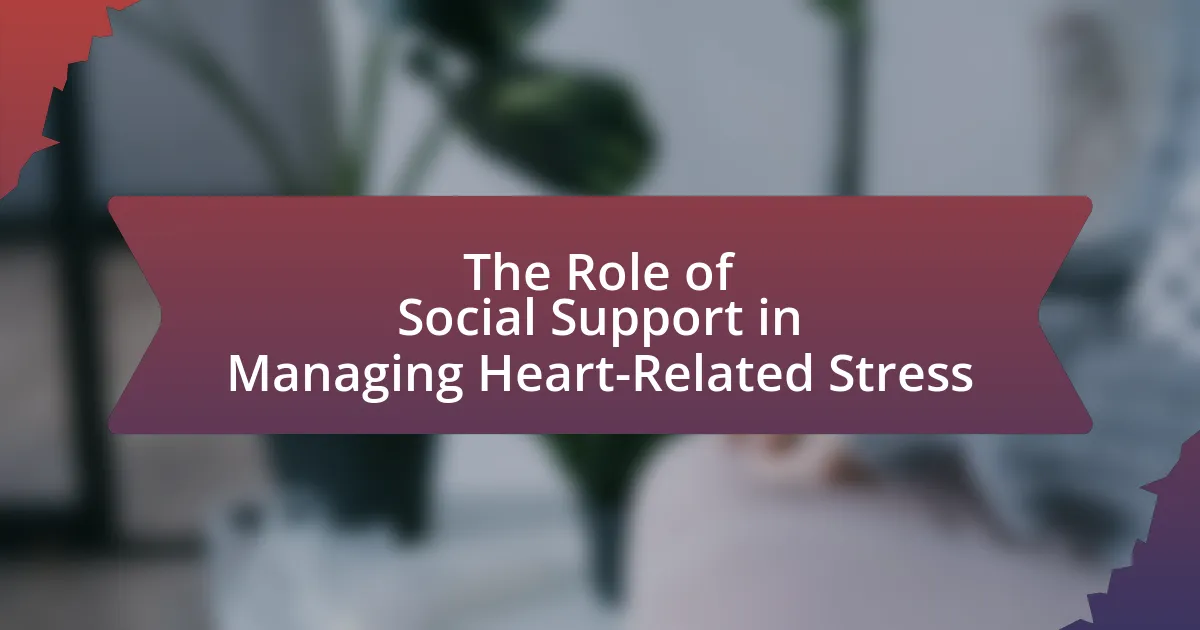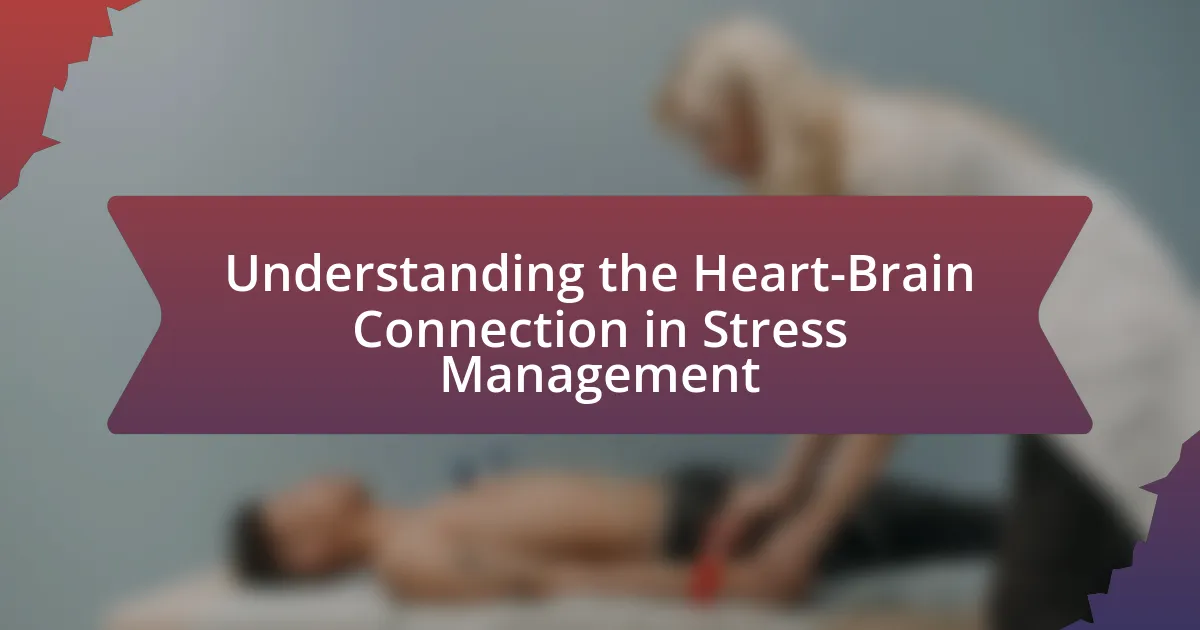The article examines the significant relationship between stress and heart health, highlighting how stress increases the risk of cardiovascular diseases through elevated cortisol and adrenaline levels, leading to hypertension and heart complications. It details the physiological changes that occur during stress, the long-term effects of chronic stress on cardiovascular health, and the role of psychological factors such as anxiety and depression in exacerbating heart issues. Additionally, the article discusses effective strategies for mitigating stress, including lifestyle changes, exercise, mindfulness practices, and the importance of social support systems in promoting heart health.

What is the relationship between stress and heart health?
Stress negatively impacts heart health by increasing the risk of cardiovascular diseases. Chronic stress leads to elevated levels of cortisol and adrenaline, which can raise blood pressure and heart rate. Research indicates that individuals experiencing high stress levels are more likely to develop heart conditions; for instance, a study published in the Journal of the American College of Cardiology found that stress is a significant risk factor for heart disease, contributing to inflammation and arterial damage.
How does stress affect the cardiovascular system?
Stress negatively impacts the cardiovascular system by increasing heart rate and blood pressure, which can lead to long-term heart disease. When an individual experiences stress, the body releases hormones such as adrenaline and cortisol, which prepare the body for a “fight or flight” response. This response causes the heart to pump faster and blood vessels to constrict, resulting in elevated blood pressure. Chronic stress can lead to persistent hypertension, increased risk of atherosclerosis, and ultimately, heart attacks or strokes. Research published in the Journal of the American College of Cardiology indicates that individuals with high stress levels are significantly more likely to develop cardiovascular diseases, highlighting the direct correlation between stress and heart health.
What physiological changes occur in the body during stress?
During stress, the body undergoes several physiological changes, primarily driven by the activation of the hypothalamic-pituitary-adrenal (HPA) axis and the autonomic nervous system. These changes include increased heart rate, elevated blood pressure, and heightened levels of stress hormones such as cortisol and adrenaline.
Increased heart rate and blood pressure occur as the body prepares for a “fight or flight” response, which is a survival mechanism. Cortisol, released from the adrenal glands, helps mobilize energy reserves but can lead to negative health effects if levels remain elevated over time. Research indicates that chronic stress can contribute to cardiovascular diseases by promoting inflammation, increasing arterial stiffness, and leading to the development of atherosclerosis.
These physiological responses are well-documented in studies, such as those published in the Journal of the American College of Cardiology, which highlight the link between stress-induced hormonal changes and heart health deterioration.
How do these changes impact heart function?
Changes in stress levels significantly impact heart function by increasing heart rate and blood pressure. Elevated stress triggers the release of hormones such as adrenaline and cortisol, which prepare the body for a ‘fight or flight’ response. This physiological reaction leads to increased cardiac output and vascular resistance, ultimately straining the heart. Chronic stress can contribute to long-term cardiovascular issues, including hypertension and increased risk of heart disease, as evidenced by studies showing that individuals with high stress levels have a 40% higher risk of heart disease compared to those with lower stress levels.
Why is understanding this relationship important?
Understanding the relationship between stress and heart health is crucial because stress is a significant risk factor for cardiovascular diseases. Research indicates that chronic stress can lead to increased heart rate, elevated blood pressure, and inflammation, all of which contribute to heart disease. For instance, a study published in the Journal of the American College of Cardiology found that individuals with high stress levels had a 27% higher risk of developing heart disease compared to those with lower stress levels. This underscores the importance of managing stress to improve heart health outcomes and reduce the incidence of cardiovascular events.
What are the potential consequences of ignoring stress on heart health?
Ignoring stress can lead to severe consequences for heart health, including increased risk of hypertension, heart disease, and heart attacks. Chronic stress triggers the release of hormones like cortisol and adrenaline, which can elevate blood pressure and heart rate. According to a study published in the Journal of the American College of Cardiology, individuals with high stress levels are 40% more likely to develop heart disease compared to those with lower stress levels. Additionally, stress can contribute to unhealthy behaviors such as poor diet, smoking, and physical inactivity, further exacerbating heart health issues.
How can awareness of this relationship lead to better health outcomes?
Awareness of the relationship between stress and heart health can lead to better health outcomes by enabling individuals to adopt stress management techniques that reduce cardiovascular risks. Research indicates that chronic stress contributes to hypertension, inflammation, and unhealthy lifestyle choices, all of which negatively impact heart health. For instance, a study published in the Journal of the American College of Cardiology found that individuals who actively manage stress through mindfulness and relaxation techniques experience lower blood pressure and improved heart function. By recognizing the detrimental effects of stress, individuals are more likely to engage in preventive measures, such as exercise and healthy eating, which further enhance cardiovascular health.
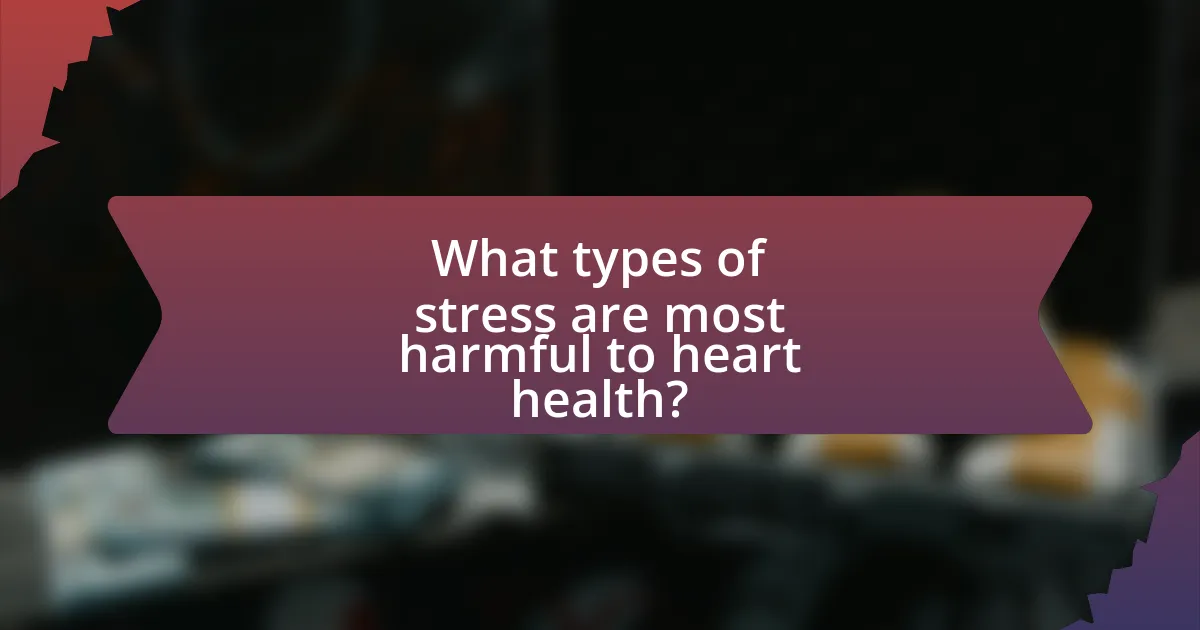
What types of stress are most harmful to heart health?
Chronic stress and acute stress are the types of stress most harmful to heart health. Chronic stress, which persists over time, can lead to increased blood pressure, elevated heart rate, and inflammation, all of which are risk factors for cardiovascular disease. Acute stress, such as that experienced during traumatic events, can trigger heart attacks and arrhythmias due to the sudden release of stress hormones like adrenaline. Research indicates that individuals experiencing high levels of chronic stress have a 40% higher risk of developing heart disease compared to those with lower stress levels.
How do acute and chronic stress differ in their effects on the heart?
Acute stress and chronic stress have distinct effects on the heart. Acute stress triggers a temporary increase in heart rate and blood pressure due to the release of stress hormones like adrenaline, which prepares the body for a “fight or flight” response. In contrast, chronic stress leads to long-term cardiovascular issues, including persistent high blood pressure, increased risk of heart disease, and inflammation, as the body remains in a heightened state of alertness over time. Research indicates that chronic stress can contribute to the development of atherosclerosis, a condition characterized by the hardening of arteries, which significantly raises the risk of heart attacks and strokes.
What are examples of acute stressors that can impact heart health?
Acute stressors that can impact heart health include sudden emotional distress, physical trauma, and intense psychological events. For instance, experiencing a traumatic event such as an accident can trigger a rapid increase in heart rate and blood pressure, which may lead to cardiovascular complications. Research indicates that acute stress can cause the release of stress hormones like cortisol and adrenaline, which can negatively affect heart function and increase the risk of heart attack. Additionally, situations such as public speaking or receiving bad news can also elicit acute stress responses, further demonstrating the direct link between acute stressors and heart health.
What long-term effects can chronic stress have on cardiovascular health?
Chronic stress can lead to significant long-term effects on cardiovascular health, including increased risk of hypertension, heart disease, and stroke. Prolonged exposure to stress hormones, such as cortisol, can cause inflammation and damage to blood vessels, contributing to the development of atherosclerosis. Studies indicate that individuals experiencing chronic stress are 40% more likely to develop heart disease compared to those with lower stress levels. Additionally, stress can lead to unhealthy coping mechanisms, such as poor diet and lack of exercise, further exacerbating cardiovascular risks.
What role do psychological factors play in stress-related heart issues?
Psychological factors significantly contribute to stress-related heart issues by influencing physiological responses such as increased heart rate and blood pressure. Stress activates the body’s fight-or-flight response, leading to the release of hormones like cortisol and adrenaline, which can damage blood vessels and increase the risk of heart disease. Research indicates that chronic stress is associated with a higher incidence of cardiovascular events; for instance, a study published in the Journal of the American College of Cardiology found that individuals with high levels of stress had a 27% increased risk of heart disease. Thus, psychological factors play a crucial role in the development and exacerbation of heart-related conditions through their impact on bodily stress responses.
How do anxiety and depression contribute to heart disease?
Anxiety and depression contribute to heart disease by increasing stress hormones, leading to inflammation and higher blood pressure. Research indicates that individuals with anxiety disorders have a 1.5 to 2 times greater risk of developing coronary artery disease compared to those without anxiety. Similarly, depression is associated with a 30-40% increased risk of heart disease, as it can lead to unhealthy behaviors such as poor diet, lack of exercise, and smoking. These psychological conditions also affect the autonomic nervous system, resulting in an imbalance that can further strain the heart.
What is the impact of lifestyle factors on stress and heart health?
Lifestyle factors significantly influence both stress levels and heart health. Poor lifestyle choices, such as a sedentary lifestyle, unhealthy diet, smoking, and excessive alcohol consumption, can elevate stress and contribute to cardiovascular diseases. For instance, research published in the Journal of the American College of Cardiology indicates that individuals with high stress levels are more likely to engage in unhealthy behaviors, which in turn increases their risk of heart disease. Additionally, the American Heart Association states that chronic stress can lead to increased blood pressure and heart rate, further straining the heart. Therefore, adopting healthier lifestyle habits can mitigate stress and improve heart health.

What strategies can help mitigate the impact of stress on heart health?
Regular physical activity is a key strategy to mitigate the impact of stress on heart health. Engaging in aerobic exercises, such as walking, running, or cycling, can lower stress hormones and improve cardiovascular function. Research indicates that individuals who exercise regularly experience reduced levels of anxiety and depression, which are linked to heart disease. For instance, a study published in the Journal of the American College of Cardiology found that moderate exercise can significantly lower the risk of heart disease by improving heart rate variability and reducing blood pressure. Additionally, practicing mindfulness techniques, such as meditation and deep breathing, can further enhance heart health by promoting relaxation and reducing stress responses.
How can lifestyle changes improve heart health in relation to stress?
Lifestyle changes can significantly improve heart health by reducing stress levels, which is a major risk factor for cardiovascular diseases. Engaging in regular physical activity, such as aerobic exercises, has been shown to lower stress hormones like cortisol and adrenaline, thereby enhancing heart function and reducing blood pressure. Additionally, adopting a balanced diet rich in fruits, vegetables, whole grains, and omega-3 fatty acids can improve overall cardiovascular health and mitigate the effects of stress on the heart. Research indicates that mindfulness practices, such as meditation and yoga, can also lower stress and improve heart rate variability, a key indicator of heart health. Studies have demonstrated that individuals who incorporate these lifestyle changes experience lower incidences of heart-related issues, highlighting the direct correlation between stress management and improved cardiovascular outcomes.
What types of exercise are most effective for reducing stress?
Aerobic exercises, such as running, swimming, and cycling, are most effective for reducing stress. These activities increase the production of endorphins, which are natural mood lifters. Research published in the Journal of Clinical Psychiatry indicates that regular aerobic exercise can significantly decrease anxiety and depression levels, contributing to overall stress reduction. Additionally, yoga and mindfulness-based exercises have been shown to lower cortisol levels, the hormone associated with stress, further supporting their effectiveness in stress management.
How does diet influence stress levels and heart health?
Diet significantly influences stress levels and heart health by affecting physiological responses and overall well-being. Nutrient-rich foods, such as fruits, vegetables, whole grains, and lean proteins, can lower stress hormones like cortisol, while diets high in processed foods, sugars, and unhealthy fats can exacerbate stress and contribute to heart disease. Research published in the journal “Nutrients” indicates that a Mediterranean diet, rich in omega-3 fatty acids and antioxidants, is associated with reduced anxiety and improved cardiovascular health. Additionally, a study in “Psychosomatic Medicine” found that individuals consuming a diet high in refined carbohydrates experienced higher levels of stress and increased risk of heart disease. Thus, dietary choices play a crucial role in managing stress and promoting heart health.
What role do relaxation techniques play in managing stress?
Relaxation techniques play a crucial role in managing stress by promoting physiological and psychological responses that counteract stress effects. These techniques, such as deep breathing, meditation, and progressive muscle relaxation, activate the body’s relaxation response, which reduces heart rate, lowers blood pressure, and decreases levels of stress hormones like cortisol. Research indicates that regular practice of relaxation techniques can lead to significant reductions in perceived stress and anxiety, thereby improving overall heart health. For instance, a study published in the Journal of the American College of Cardiology found that patients who engaged in relaxation techniques experienced lower blood pressure and improved heart rate variability, both of which are indicators of better cardiovascular health.
Which mindfulness practices are beneficial for heart health?
Mindfulness practices that are beneficial for heart health include meditation, deep breathing exercises, and yoga. These practices have been shown to reduce stress, lower blood pressure, and improve overall cardiovascular function. For instance, a study published in the Journal of the American College of Cardiology found that mindfulness meditation can significantly lower blood pressure and improve heart rate variability, which are critical indicators of heart health. Additionally, yoga has been associated with reduced levels of cortisol, a stress hormone that negatively impacts heart health.
How can social support systems help reduce stress-related heart risks?
Social support systems can significantly reduce stress-related heart risks by providing emotional, informational, and practical assistance, which helps individuals manage stress more effectively. Research indicates that strong social connections can lower blood pressure, reduce cortisol levels, and improve overall heart health. For instance, a study published in the Journal of the American College of Cardiology found that individuals with robust social networks had a 50% lower risk of heart disease compared to those with weaker social ties. This demonstrates that social support not only alleviates stress but also contributes to better cardiovascular outcomes.
What practical steps can individuals take to protect their heart health from stress?
Individuals can protect their heart health from stress by engaging in regular physical activity, practicing mindfulness techniques, and maintaining a balanced diet. Regular exercise, such as aerobic activities, has been shown to reduce stress hormones and improve cardiovascular health, with studies indicating that just 150 minutes of moderate exercise per week can significantly lower the risk of heart disease. Mindfulness practices, including meditation and deep-breathing exercises, have been proven to decrease stress levels and improve heart rate variability, which is linked to better heart health. Additionally, a balanced diet rich in fruits, vegetables, whole grains, and healthy fats can help mitigate the effects of stress on the heart, as evidenced by research that shows diets high in antioxidants and omega-3 fatty acids can lower inflammation and improve heart function.
